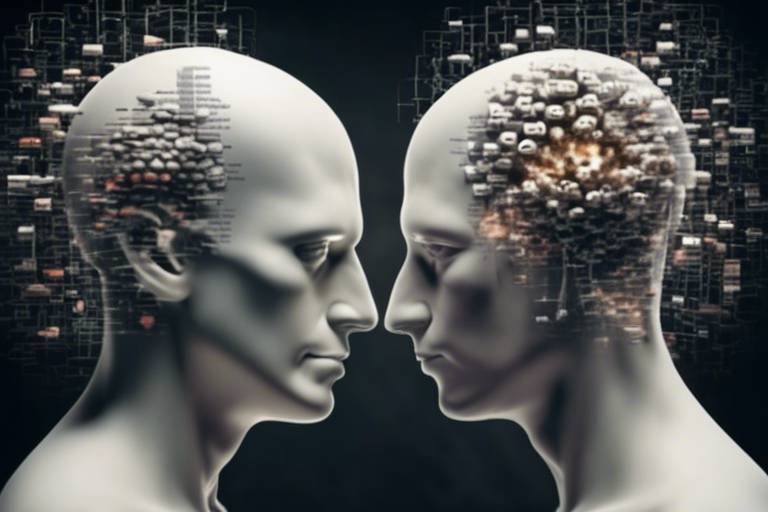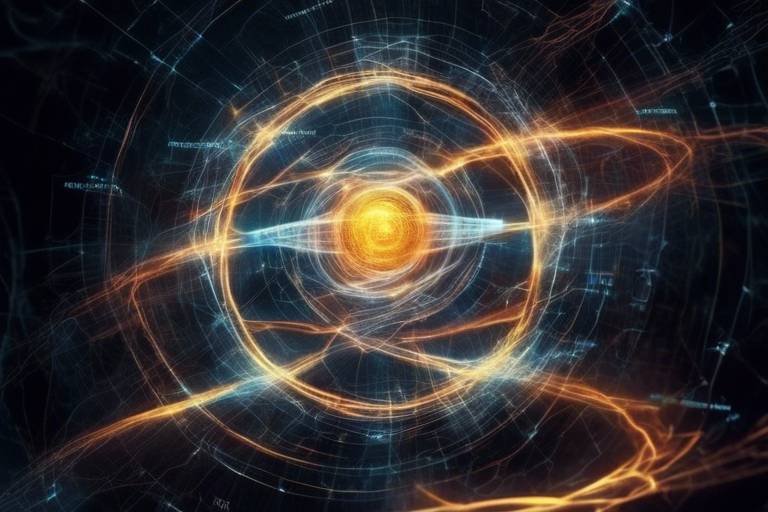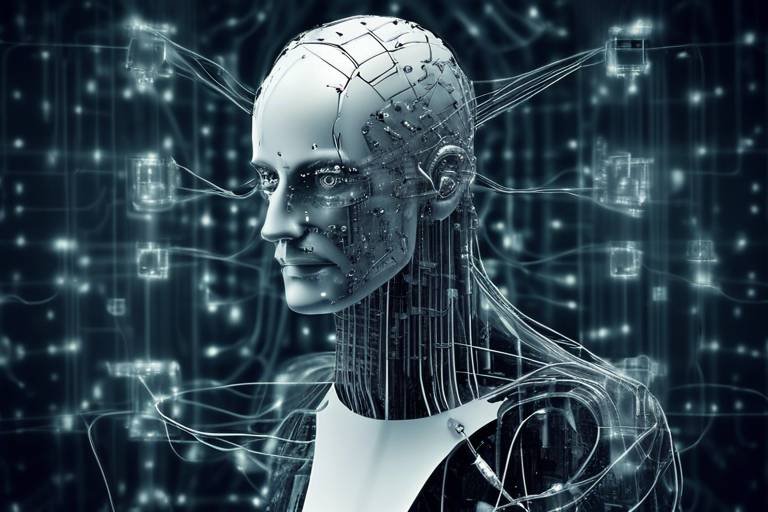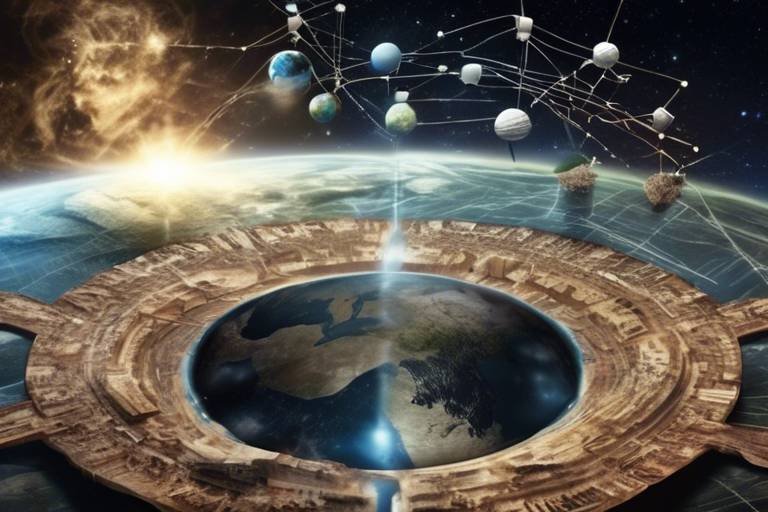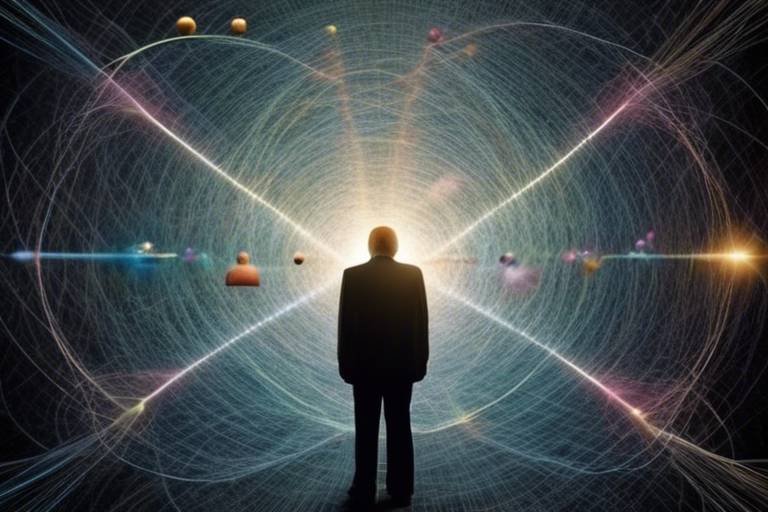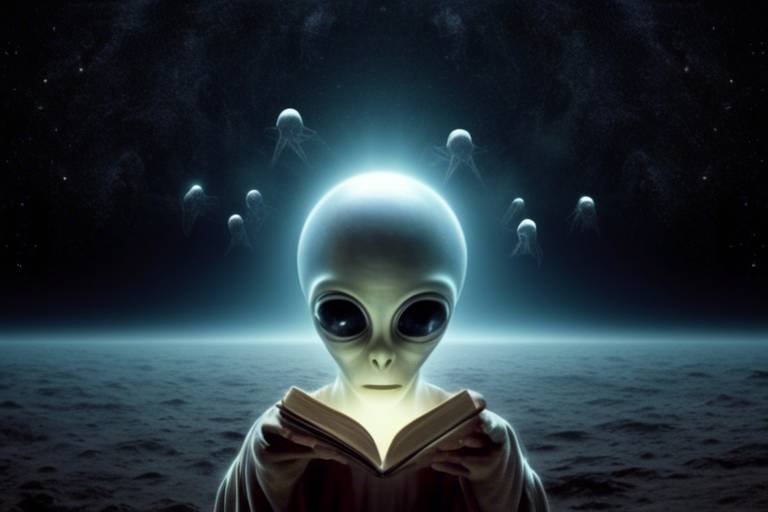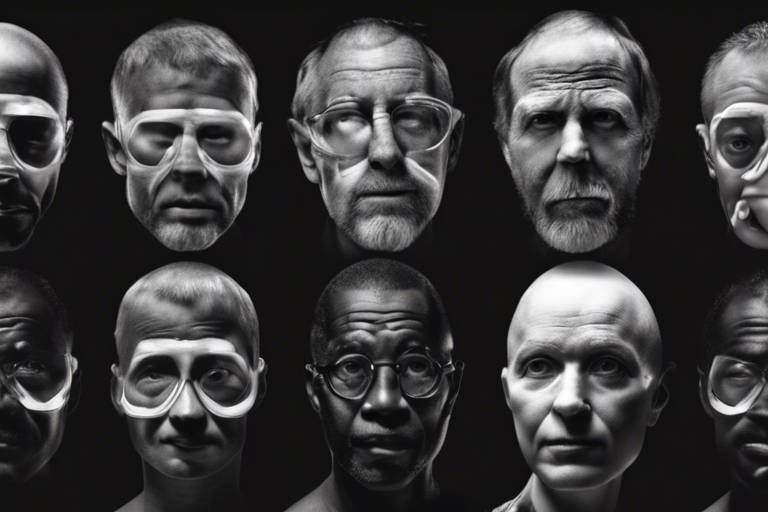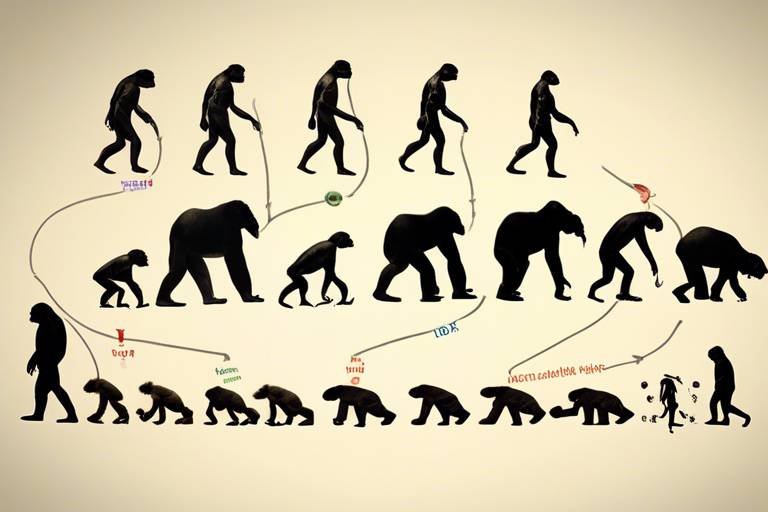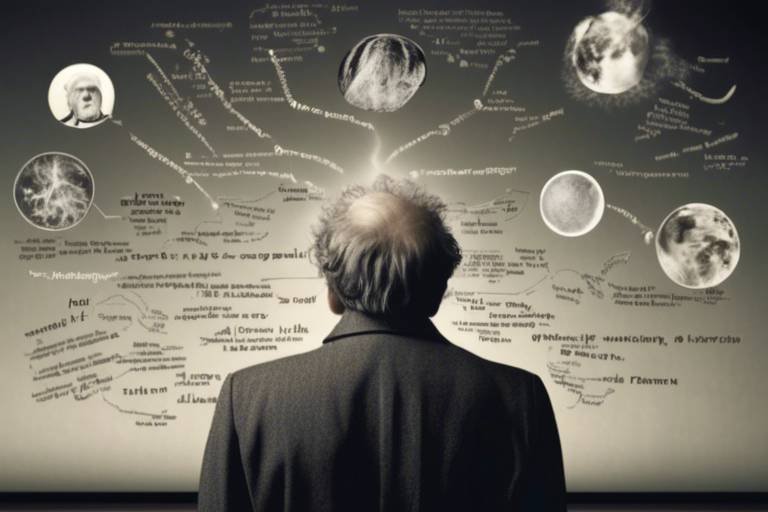Quantum Consciousness - The Intersection of Philosophy and Quantum Physics
Have you ever wondered about the nature of reality and the role of consciousness within it? The relationship between quantum physics and consciousness is a captivating subject that merges the realms of science and philosophy, creating a rich tapestry of inquiry and exploration. As we delve into this intriguing intersection, we uncover layers of complexity that challenge our conventional understanding of both the universe and our place within it. This article will guide you through the fascinating principles of quantum mechanics and their philosophical implications, inviting you to ponder questions that have perplexed thinkers for centuries.
At its core, quantum consciousness suggests that our awareness and perception may be intertwined with the fundamental laws of physics. Imagine consciousness as a vast ocean, with quantum mechanics serving as the waves that ripple through it, shaping our experiences in ways we are only beginning to understand. This exploration is not just an academic exercise; it has profound implications for how we perceive existence, reality, and even spirituality. Are we mere observers in a deterministic universe, or do we play an active role in shaping our experiences? The answers to these questions lie at the heart of the quantum consciousness debate.
As we embark on this journey, we will examine key concepts such as superposition and entanglement, which are pivotal in quantum mechanics. These principles not only challenge our understanding of physical reality but also open up new avenues for interpreting consciousness. We will explore how the act of observation can alter the state of a system, raising questions about the nature of reality itself. Is consciousness merely a byproduct of brain activity, or is it a fundamental aspect of the universe? These are the profound inquiries that guide our exploration.
Moreover, we will delve into various philosophical perspectives that have emerged in response to the relationship between quantum physics and consciousness. From dualism to materialism and idealism, each viewpoint offers unique insights and challenges that enrich our understanding of this complex interplay. We will also touch upon the concept of panpsychism, which posits that consciousness is a fundamental feature of all matter, suggesting that awareness might be more widespread than we ever imagined.
In the following sections, we will explore these ideas in greater detail, examining how quantum mechanics might illuminate the mysteries of consciousness and vice versa. Together, we will unearth the implications of these theories for both science and spirituality, encouraging a dialogue that transcends traditional boundaries. So, buckle up as we embark on this enlightening journey into the heart of quantum consciousness!
- What is quantum consciousness? Quantum consciousness is the idea that consciousness may be linked to the principles of quantum mechanics, suggesting that our awareness could influence or be influenced by the fundamental laws of physics.
- How does quantum mechanics relate to consciousness? Quantum mechanics introduces concepts such as superposition and entanglement, which may provide insights into the nature of consciousness and how we perceive reality.
- What are some philosophical perspectives on quantum consciousness? Various philosophical viewpoints, including dualism, materialism, and panpsychism, offer different interpretations of the relationship between consciousness and quantum physics.
- Can quantum consciousness impact spirituality? Yes, the intersection of quantum consciousness and spirituality can lead to a deeper understanding of existence, awareness, and the interconnectedness of all things.

The Nature of Consciousness
Consciousness is one of the most profound and perplexing phenomena we encounter as human beings. It is the very essence of our existence, the lens through which we perceive the world around us. But what exactly is consciousness? Is it merely a byproduct of brain activity, or does it represent something far more intricate and mysterious? Across various cultures and philosophies, consciousness has been defined in numerous ways, each interpretation adding to the enigma of our conscious experience.
At its core, consciousness encompasses our thoughts, feelings, perceptions, and awareness. It is the state of being awake and aware of one’s surroundings and internal states. Yet, the complexity of consciousness extends beyond this simple definition. For instance, consider how different cultures perceive consciousness:
- Western Philosophy: Often views consciousness as a product of the brain, emphasizing a materialistic approach.
- Eastern Philosophy: Frequently regards consciousness as a fundamental aspect of reality, intertwined with the universe itself.
- Indigenous Beliefs: Often see consciousness as interconnected with nature and the cosmos, suggesting a shared experience among all living beings.
This rich tapestry of interpretations highlights the complexity and mystery surrounding consciousness. It raises questions that have puzzled philosophers for centuries: Is consciousness a unique trait of humans, or do other beings possess it too? Can consciousness exist independently of the physical body? These questions lead us to contemplate the very nature of reality itself.
Furthermore, the exploration of consciousness is not just a philosophical endeavor; it has significant implications in the realms of psychology, neuroscience, and even quantum physics. As we delve deeper into understanding consciousness, we find ourselves at the intersection of science and spirituality, where the boundaries of knowledge blur, and new possibilities emerge.
In the quest to understand consciousness, researchers have proposed various theories, including the notion that consciousness may be a fundamental feature of the universe, akin to space and time. This perspective invites us to reconsider our assumptions about what it means to be conscious and how we relate to the universe at large. It opens the door to an exciting dialogue between science and philosophy, encouraging a collaborative exploration of one of humanity's most enduring mysteries.
As we continue our exploration of quantum consciousness, it becomes clear that understanding the nature of consciousness is not just an academic exercise; it is a journey into the very essence of who we are. The implications of this journey could reshape our understanding of existence, awareness, and our place in the cosmos.

Quantum Mechanics Basics
When we dive into the world of quantum mechanics, we're stepping into a realm that challenges our everyday understanding of reality. At its core, quantum mechanics is the branch of physics that deals with the behavior of particles at the smallest scales—think atoms and subatomic particles. Unlike classical physics, which describes the macroscopic world we experience daily, quantum mechanics reveals a bizarre and counterintuitive universe where particles can exist in multiple states at once and can be interconnected in ways that defy our conventional notions of space and time.
To grasp the essence of quantum mechanics, we need to familiarize ourselves with a few fundamental principles:
- Superposition: This principle suggests that particles can exist in multiple states simultaneously until they are observed. It's like flipping a coin; until you take a look, it’s both heads and tails at the same time!
- Entanglement: Once two particles become entangled, the state of one particle is directly related to the state of another, regardless of the distance separating them. Imagine having a pair of magic dice; no matter how far apart you roll them, they always show the same number!
- Wave-Particle Duality: Particles, such as electrons, exhibit both wave-like and particle-like properties. This means they can behave like a wave under certain conditions and like a particle under others, creating a fascinating duality that challenges our perception of matter.
These principles set the stage for understanding how quantum mechanics may intersect with consciousness. For instance, the notion of superposition could imply that our conscious experience might not be as linear or straightforward as we think. Instead, it might be a complex tapestry of possibilities, where various thoughts and experiences coexist until we 'measure' or focus on one particular aspect.
Moreover, the measurement problem in quantum mechanics raises profound questions about the nature of reality itself. When we observe a quantum system, we inadvertently alter its state—a phenomenon that parallels the idea that our conscious awareness can shape our perception of reality. It's almost as if our minds are not just passive observers but active participants in the unfolding of the universe.
As we explore these concepts further, we begin to see how quantum mechanics doesn't just apply to the physical sciences but also invites philosophical inquiries into the nature of consciousness. What does it mean for our understanding of self and existence when we consider that the act of observation can fundamentally change the state of reality? This interplay between quantum mechanics and consciousness opens up a Pandora's box of questions that can lead us down a rabbit hole of existential exploration.
In summary, quantum mechanics offers us a window into a world that is both fascinating and perplexing. As we unravel its mysteries, we find ourselves not only questioning the nature of particles and waves but also pondering the very essence of consciousness itself. This intertwining of science and philosophy invites us to rethink our understanding of reality, consciousness, and our place within the universe.

Superposition and Consciousness
When we dive into the realm of quantum mechanics, one of the most mind-boggling concepts we encounter is superposition. Imagine a coin spinning in the air; while it’s twirling, it’s not just heads or tails, but rather a blend of both until it lands. This analogy gives us a glimpse into how superposition works at a quantum level, where particles can exist in multiple states simultaneously. Now, how does this relate to consciousness? Well, that’s where it gets intriguing.
The relationship between superposition and consciousness invites us to ponder whether our conscious experiences are similarly layered. Could it be that, like particles, our thoughts and perceptions exist in a state of superposition before we make a decision or come to a realization? For example, consider a moment of indecision—when you’re contemplating two different paths in life. In that moment, both possibilities may coexist in your mind, influencing your eventual choice. This phenomenon could reflect a quantum-like process of collapsing possibilities into a single outcome, akin to how a quantum state collapses upon observation.
Moreover, the implications of superposition extend beyond individual consciousness to the collective experience of reality. If we consider consciousness as a spectrum rather than a binary state, we might begin to understand how different states of awareness can coexist within a single mind or even among multiple minds. This leads us to ponder the interconnectedness of consciousness. Are our thoughts and experiences merely isolated incidents, or do they exist in a vast web of potentialities, much like entangled particles? The idea that our consciousness might operate in a superposed state suggests a deeper, more intricate relationship with the universe around us.
In exploring the intersection of superposition and consciousness, we also encounter the measurement problem in quantum mechanics. This problem raises the question of how and when a quantum system transitions from a superposition of states to a single outcome. In terms of consciousness, this could imply that our awareness is not just a straightforward reflection of reality but rather a complex interplay of potential states that we navigate through observation and choice. The act of becoming aware may itself be a form of measurement that collapses the myriad possibilities into a singular experience.
Ultimately, the notion of superposition invites us to reconsider the nature of consciousness itself. Are we merely passive observers of reality, or do we actively shape it through our awareness? This question resonates deeply within both scientific and philosophical realms, sparking debates about the essence of existence and the role of consciousness in shaping our understanding of the universe. As we continue to explore these connections, we may uncover profound insights into the very fabric of reality and our place within it.
- What is superposition in quantum mechanics? Superposition is the principle that a quantum system can exist in multiple states at once until it is measured or observed.
- How does superposition relate to consciousness? The concept suggests that our conscious experiences may also exist in multiple potential states before we become aware of them.
- What is the measurement problem? The measurement problem questions how and when a quantum system transitions from a superposition of states to a single outcome upon observation.
- Can consciousness influence reality? Some theories propose that consciousness plays an active role in shaping reality, similar to how observation affects quantum states.

Measurement Problem
The measurement problem in quantum mechanics is one of the most perplexing issues that both scientists and philosophers grapple with. At its core, it revolves around the question: what happens when we measure a quantum system? Before measurement, particles exist in a state of superposition, where they can be in multiple states at once. However, the moment we observe or measure these particles, they seem to 'collapse' into a single state. This phenomenon raises profound questions about the nature of reality and consciousness.
To illustrate this, consider the famous thought experiment known as Schrödinger's Cat. Imagine a cat placed in a sealed box with a radioactive atom. If the atom decays, it triggers a mechanism that kills the cat; if it doesn't, the cat remains alive. According to quantum mechanics, until we open the box and observe the cat, it is simultaneously alive and dead—existing in a state of superposition. Only upon observation does the cat 'choose' one of these states. This paradox not only highlights the oddities of quantum mechanics but also prompts us to question the role of the observer in shaping reality.
The implications of the measurement problem extend beyond physics and into the realm of consciousness. If our observation can influence the outcome of an event at the quantum level, could it be that consciousness itself plays a crucial role in the fabric of reality? This leads us to ponder whether consciousness is merely a byproduct of complex neurological processes or if it is something more profound—perhaps a fundamental aspect of the universe. The measurement problem challenges our understanding of the relationship between the observer and the observed, suggesting that our conscious awareness may be integral to the existence of reality itself.
In summary, the measurement problem is not just a technical issue within quantum mechanics; it's a deep philosophical conundrum that invites us to rethink our understanding of consciousness and its relationship to the universe. As we delve deeper into this mystery, we may find that the answers lie at the intersection of science and philosophy, opening up new avenues for exploration and understanding.
- What is the measurement problem in quantum mechanics?
The measurement problem refers to the challenge of understanding how quantum systems transition from a state of superposition to a definite state upon measurement. - How does the observer effect relate to the measurement problem?
The observer effect suggests that the act of observation can influence the outcome of a quantum event, which is a key aspect of the measurement problem. - What is Schrödinger's Cat thought experiment?
Schrödinger's Cat illustrates the paradox of superposition, where a cat in a sealed box is considered both alive and dead until observed. - Does consciousness play a role in quantum mechanics?
Some theories propose that consciousness may influence quantum events, suggesting a deeper connection between mind and matter.

Observer Effect
The in quantum physics is one of those mind-bending concepts that can make your head spin. At its core, it suggests that the very act of observing a quantum system can alter the state of that system. Imagine a game of hide-and-seek, where the moment you peek to find your friend, they change their hiding spot. This analogy captures the essence of the observer effect; the act of observation is not just passive but actively influences the outcome.
In quantum mechanics, particles exist in a state of superposition, meaning they can be in multiple states at once until they are observed. When we measure or observe these particles, they 'collapse' into one state. This brings up profound questions about the nature of reality: Is the universe a fixed entity, or is it a dynamic interplay of possibilities that only solidifies into a specific outcome when we look? The implications stretch far beyond physics and into the realm of consciousness itself.
To illustrate this concept further, consider the famous double-slit experiment. When particles like electrons are fired at a barrier with two slits, they create an interference pattern, suggesting they pass through both slits simultaneously. However, when we observe which slit the electron goes through, that interference pattern disappears, and we only see particles behaving like solid objects. This experiment encapsulates the observer effect and raises the question: what role does consciousness play in shaping reality?
Many theorists argue that consciousness acts as a crucial component in this quantum dance. If our thoughts and observations can influence the behavior of particles, could it be that consciousness itself is a fundamental aspect of the universe? This notion aligns with various philosophical perspectives that explore the interconnectedness of mind and matter.
Ultimately, the observer effect challenges our traditional views of reality. It suggests that our perceptions might not just reflect the universe but actively participate in its unfolding. As we delve deeper into quantum consciousness, we find ourselves at the intersection of science and philosophy, where the mysteries of existence and awareness intertwine.
- What is the observer effect?
The observer effect refers to the phenomenon in quantum mechanics where the act of measuring or observing a particle alters its state. - How does the observer effect relate to consciousness?
Some theories propose that consciousness plays a role in determining the state of quantum systems, suggesting a deep connection between mind and matter. - What is the double-slit experiment?
This experiment demonstrates the observer effect by showing that particles can behave as waves until observed, at which point they behave like particles. - Why is the observer effect significant?
The observer effect challenges our understanding of reality and raises philosophical questions about the nature of existence and the role of consciousness in shaping it.

Entanglement and Mind
When we dive into the fascinating world of quantum entanglement, we uncover a realm that challenges our conventional understanding of reality and, intriguingly, our own consciousness. Imagine two particles that, no matter how far apart they are in the universe, remain connected in such a way that the state of one instantly influences the state of the other. This phenomenon, known as quantum entanglement, raises profound questions about the nature of our minds and the interconnectedness of consciousness across space and time.
At its core, entanglement suggests that everything in the universe is interwoven in a complex tapestry, where the actions or states of one entity can have immediate effects on another. This leads us to ponder: could our minds be similarly entangled? Are our thoughts, feelings, and experiences interconnected in ways we have yet to understand? Some theorists propose that entangled particles might serve as a metaphor for how consciousness could operate on a collective level, suggesting that our individual experiences are part of a larger, unified consciousness.
To illustrate this idea, consider the following:
- Collective Consciousness: Just as entangled particles share information instantaneously, could human consciousness also be linked in a way that transcends individual perception?
- Shared Experiences: Think about moments when you feel an intense connection with someone, as if you can sense their emotions or thoughts. This could be akin to a form of entanglement at a psychological level.
- Telepathy and Intuition: Some people claim to experience telepathic moments or strong intuitive feelings about others. Could these instances be manifestations of a deeper entangled consciousness?
Moreover, the implications of quantum entanglement extend beyond mere philosophical musings. They invite scientific inquiry into how our minds might operate within the framework of quantum mechanics. Researchers are beginning to explore whether consciousness itself could be a quantum process, where entangled states play a role in how we perceive and interact with the world around us.
While the scientific community remains divided on these ideas, the intersection of quantum physics and consciousness offers a rich ground for exploration. It challenges us to reconsider our definitions of self and reality. Are we merely isolated beings, or are we part of a larger, interconnected web of existence? The answers may lie in the very fabric of quantum mechanics, waiting for us to unravel their mysteries.
As we continue to investigate the entanglement of mind and matter, we may find that the universe is not as separate and fragmented as we once believed. Instead, it could be a harmonious symphony of consciousness, resonating through the fabric of reality itself.
- What is quantum entanglement?
Quantum entanglement is a phenomenon where two particles become interconnected in such a way that the state of one particle affects the state of another, regardless of the distance separating them. - How does quantum entanglement relate to consciousness?
Some theorists propose that entanglement could provide insights into the interconnectedness of human consciousness, suggesting that our minds may be linked in ways we do not fully understand. - Is there scientific evidence linking quantum mechanics and consciousness?
The exploration of this link is still in its infancy, with ongoing debates and research in both fields. While some theories suggest a connection, conclusive scientific evidence is yet to be established.

Philosophical Perspectives
When we dive into the fascinating world of quantum consciousness, we inevitably encounter a myriad of philosophical perspectives that attempt to make sense of this complex intersection. Each viewpoint offers a unique lens through which we can examine the nature of consciousness and its relationship with the quantum realm. Let's explore some of these perspectives, starting with dualism, which posits that the mind and body are fundamentally different substances. This idea, championed by philosophers like René Descartes, raises questions about how a non-physical mind can influence a physical body, especially in light of quantum phenomena.
On the other end of the spectrum lies materialism, which asserts that everything, including consciousness, can be explained through physical processes. This perspective aligns with a more scientific approach, suggesting that consciousness arises from complex interactions within the brain. However, materialism struggles to account for the subjective experience of consciousness—how it feels to be aware and to perceive the world around us. This gap invites a deeper investigation into how quantum mechanics might bridge the divide between the physical and the experiential.
Then we have idealism, a viewpoint that suggests reality is fundamentally mental or spiritual in nature. This perspective posits that consciousness creates the material world rather than merely observing it. Idealism resonates with certain interpretations of quantum mechanics, particularly those that emphasize the role of the observer in determining reality. If consciousness is indeed a primary component of the universe, as idealists argue, then the implications for our understanding of existence are profound.
Among these philosophical frameworks, panpsychism stands out as a compelling contender. This view posits that consciousness is a fundamental feature of all matter, suggesting that even the tiniest particles possess some form of awareness. Panpsychism could provide a unifying theory that connects consciousness with the quantum world, as it implies a shared web of consciousness that permeates the universe. This perspective challenges the traditional boundaries we place on what it means to be conscious and invites us to consider a more interconnected reality.
As we navigate through these philosophical perspectives, it becomes evident that the intersection of consciousness and quantum physics is not merely an academic pursuit; it has the potential to reshape our understanding of reality itself. The dialogue between these fields encourages us to ask questions that probe the depths of our existence:
- What is the true nature of consciousness?
- How do our observations influence the reality we experience?
- Can we reconcile the physical and the mental in a coherent framework?
In conclusion, the philosophical perspectives surrounding quantum consciousness are as diverse as they are profound. They invite us to explore the mysteries of existence, urging us to reconsider the very fabric of reality. As we continue to unravel these complex ideas, we may find ourselves on the brink of a new understanding—one that integrates the realms of science, philosophy, and spirituality into a cohesive narrative of what it means to be conscious in a quantum universe.
1. What is the relationship between quantum mechanics and consciousness?
Quantum mechanics explores the behavior of particles at the smallest scales, while consciousness pertains to the awareness and experience of individuals. Some theories suggest that quantum processes may play a role in how consciousness arises.
2. How do different philosophical perspectives interpret consciousness?
Philosophical perspectives such as dualism, materialism, idealism, and panpsychism offer various interpretations of consciousness, each with unique implications for understanding its nature and relationship with the physical world.
3. Can consciousness influence quantum events?
The observer effect in quantum mechanics suggests that the act of observation can influence outcomes, leading some to speculate about the role of consciousness in shaping reality at the quantum level.

Panpsychism
Panpsychism is a fascinating philosophical perspective that posits that consciousness is not just a trait of complex organisms, but rather a fundamental aspect of the universe itself. Imagine a vast ocean where every drop of water holds a tiny spark of awareness; that's the essence of panpsychism. This view challenges the traditional notion that consciousness is exclusive to humans and perhaps a few advanced animals. Instead, it suggests that all matter, from the smallest particle to the largest celestial body, possesses some form of consciousness or experience.
The implications of panpsychism are profound. If consciousness is indeed a universal feature, it invites us to reconsider our relationship with the world around us. Rather than seeing ourselves as isolated entities in a mechanistic universe, we might view ourselves as interconnected nodes in a vast web of consciousness. This perspective aligns intriguingly with certain interpretations of quantum mechanics, where the boundaries between observer and observed become blurred. Could it be that the very fabric of reality is woven with threads of awareness? This question leads us to explore how panpsychism interfaces with quantum theories.
One of the most compelling aspects of panpsychism is its ability to bridge the gap between science and spirituality. It encourages a dialogue between the empirical rigor of scientific inquiry and the rich tapestry of spiritual experience. By acknowledging consciousness as a fundamental aspect of reality, panpsychism opens the door to a more holistic understanding of existence. This perspective invites us to consider not just what it means to be conscious, but also what it means to be part of a conscious universe.
In the context of quantum mechanics, panpsychism offers intriguing possibilities. For instance, if consciousness is a fundamental property of all matter, then the phenomena of superposition and entanglement might be seen as manifestations of a universal consciousness. This idea suggests that when particles are entangled, they are not just connected in a physical sense; they might also share a deeper, conscious connection. Such a view could radically alter our understanding of both consciousness and the universe.
To illustrate the core tenets of panpsychism, consider the following table:
| Aspect | Description |
|---|---|
| Fundamental Nature | Consciousness exists in all matter. |
| Interconnectedness | All entities share a collective awareness. |
| Implications for Science | Challenges reductionist views in physics and biology. |
| Spiritual Perspective | Encourages a deeper connection to the universe. |
In summary, panpsychism not only enriches our understanding of consciousness but also invites us to rethink our place in the cosmos. It challenges us to embrace a worldview where consciousness is not an anomaly but a fundamental characteristic of existence. As we delve deeper into the mysteries of quantum physics, the dialogue between panpsychism and science may illuminate new pathways for understanding the nature of reality itself.
- What is panpsychism? Panpsychism is the philosophical view that consciousness is a fundamental feature of all matter, suggesting that everything in the universe possesses some form of awareness.
- How does panpsychism relate to quantum mechanics? Panpsychism posits that consciousness may be an intrinsic quality of matter, which can align with quantum phenomena like superposition and entanglement, suggesting interconnectedness at a fundamental level.
- What are the implications of panpsychism for science and spirituality? It bridges the gap between scientific inquiry and spiritual experience, inviting a more holistic understanding of existence and our interconnectedness with the universe.

Quantum Consciousness Theories
The exploration of is a fascinating journey that bridges the gap between science and philosophy. At the heart of these theories lies the idea that consciousness is not merely a byproduct of brain activity but could be fundamentally intertwined with the fabric of the universe itself. This notion challenges traditional views and invites us to consider the possibility that our awareness plays a more significant role in shaping reality.
One prominent theory is that of Orchestrated Objective Reduction (Orch-OR), proposed by physicist Roger Penrose and anesthesiologist Stuart Hameroff. This theory suggests that consciousness arises from quantum processes occurring within the microtubules of neurons. According to Orch-OR, these quantum states can collapse into definite outcomes through a process that Penrose describes as objective reduction. This collapse is not just a random event; it is orchestrated by the brain's structure and function, suggesting a deep connection between consciousness and quantum mechanics.
Another intriguing perspective comes from David Bohm's theory of Implicate Order. Bohm posits that the universe is a holistic entity where everything is interconnected. In this view, consciousness is not separate from the physical world but is instead a manifestation of the underlying order of the universe. This interconnectedness implies that our thoughts and experiences are not isolated but are part of a larger, interconnected whole—a concept that resonates with many spiritual traditions.
Furthermore, the idea of quantum entanglement adds another layer to the discourse on consciousness. When particles become entangled, the state of one particle is dependent on the state of another, regardless of the distance separating them. Some theorists propose that this phenomenon might extend to consciousness, suggesting that our minds could be entangled in ways that influence our thoughts, emotions, and experiences. This raises exciting questions about collective consciousness and the potential for shared experiences beyond the individual level.
To summarize the key theories in quantum consciousness, we can look at the following table:
| Theory | Proponents | Key Concept |
|---|---|---|
| Orch-OR | Roger Penrose, Stuart Hameroff | Consciousness arises from quantum processes in microtubules. |
| Implicate Order | David Bohm | The universe is a holistic entity; consciousness is part of a larger order. |
| Quantum Entanglement | Various theorists | Mind may be interconnected through entangled states. |
As we delve deeper into these theories, it's essential to recognize that the intersection of quantum physics and consciousness is still largely speculative. However, the implications of these ideas are profound, potentially reshaping our understanding of reality, existence, and the nature of awareness itself. Could it be that our consciousness plays a pivotal role in the universe? Are we, in fact, co-creators of our reality? These questions remain at the forefront of the ongoing dialogue between science and philosophy.
- What is the Orch-OR theory? The Orch-OR theory suggests that consciousness arises from quantum processes in the brain's microtubules.
- How does quantum entanglement relate to consciousness? Quantum entanglement may imply that consciousness is interconnected, allowing for shared experiences beyond individual awareness.
- What does David Bohm's implicate order suggest? Bohm's implicate order proposes that the universe is a holistic entity where everything is interconnected, including consciousness.

Implications for Science and Spirituality
The intersection of quantum consciousness opens up a fascinating dialogue between science and spirituality. As we delve deeper into the realms of quantum physics, we find ourselves questioning not just the mechanics of the universe, but also the very nature of our existence and awareness. What if our understanding of consciousness is not just a byproduct of biological processes, but something more profound, something that connects us to the universe on a fundamental level? This question leads us to consider the implications of quantum mechanics on our spiritual beliefs.
Many scientists and philosophers argue that the principles of quantum mechanics could provide a framework for understanding consciousness that transcends traditional scientific boundaries. For instance, the concept of entanglement suggests that particles can be interconnected in ways that defy classical explanations. This notion of interconnectedness can resonate deeply within spiritual contexts, where the idea of unity and collective consciousness is often emphasized. If everything is connected at a quantum level, could this imply a shared consciousness that transcends individual experiences?
Furthermore, the observer effect in quantum physics raises profound questions about the role of consciousness in shaping reality. When we observe a phenomenon, we inevitably alter it. This suggests that our awareness does not merely reflect reality but actively participates in its creation. Such a perspective aligns with many spiritual traditions that teach the power of intention and thought in manifesting our experiences. It leads us to ponder: Are we co-creators of our reality, shaping the world around us through our conscious awareness?
To better understand these implications, consider the following table that summarizes some key intersections between quantum physics and spiritual concepts:
| Quantum Concept | Spiritual Interpretation |
|---|---|
| Entanglement | Interconnectedness of all beings |
| Observer Effect | Consciousness shapes reality |
| Superposition | Multiplicity of experiences |
| Non-locality | Unity beyond physical boundaries |
Moreover, as we explore these intersections, we must also recognize the potential for a new paradigm where science and spirituality are not seen as opposing forces but as complementary paths leading to a greater understanding of the universe. This holistic approach could pave the way for innovative research that bridges gaps between disciplines, fostering a more integrated view of existence.
In conclusion, the implications of quantum consciousness extend far beyond theoretical discussions. They invite us to reconsider our place in the universe and the nature of our reality. By embracing both scientific inquiry and spiritual exploration, we may uncover profound insights that enrich our understanding of consciousness and existence itself.
- What is quantum consciousness? Quantum consciousness refers to the idea that quantum mechanics may play a role in the nature of consciousness, suggesting a deeper connection between the mind and the universe.
- How does quantum mechanics relate to spirituality? Quantum mechanics introduces concepts like interconnectedness and the observer effect, which resonate with many spiritual beliefs about unity and the role of consciousness in shaping reality.
- Can science and spirituality coexist? Yes, many believe that science and spirituality can complement each other, providing a more holistic understanding of existence and consciousness.
- What is the observer effect? The observer effect is a phenomenon in quantum mechanics where the act of observation alters the state of a system, suggesting that consciousness plays a role in the creation of reality.
Frequently Asked Questions
- What is quantum consciousness?
Quantum consciousness is a fascinating concept that explores the relationship between quantum mechanics and the nature of consciousness. It suggests that consciousness may be influenced by quantum phenomena, such as superposition and entanglement, challenging our traditional understanding of reality.
- How does superposition relate to consciousness?
Superposition in quantum mechanics refers to a system being in multiple states at once until measured. This idea can be metaphorically linked to consciousness, suggesting that our conscious experiences may encompass multiple possibilities before we become aware of a specific thought or decision.
- What is the measurement problem, and why is it important?
The measurement problem in quantum mechanics addresses how observation affects the state of a quantum system. This is crucial for consciousness studies because it raises questions about the role of the observer and how our awareness might influence reality itself.
- Can you explain the observer effect?
The observer effect is the phenomenon where the act of observing a quantum system changes its state. This concept can be linked to consciousness, suggesting that our awareness might play a role in shaping our experiences and the reality we perceive.
- What is quantum entanglement, and how does it relate to consciousness?
Quantum entanglement is a phenomenon where particles become interconnected, such that the state of one instantly influences the state of another, regardless of distance. This interconnectedness raises intriguing questions about collective consciousness and whether our minds might be linked in similar ways.
- What are some philosophical perspectives on quantum consciousness?
Various philosophical perspectives, such as dualism, materialism, and idealism, interpret the intersection of quantum mechanics and consciousness differently. Each viewpoint offers unique insights into the nature of reality and our understanding of consciousness.
- What is panpsychism, and how does it connect to quantum mechanics?
Panpsychism is the idea that consciousness is a fundamental aspect of the universe, present in all matter. This perspective aligns with certain interpretations of quantum mechanics, suggesting a deeper connection between consciousness and the fabric of reality.
- Are there specific theories linking quantum mechanics and consciousness?
Yes, there are several theories that propose connections between quantum mechanics and consciousness, including those by notable thinkers like Roger Penrose and David Bohm. These theories explore how quantum processes might underpin conscious experience and awareness.
- What are the implications of quantum consciousness for science and spirituality?
The intersection of quantum consciousness has profound implications for both science and spirituality, potentially reshaping our understanding of existence, awareness, and the nature of reality itself. It invites a dialogue between scientific inquiry and spiritual exploration.


